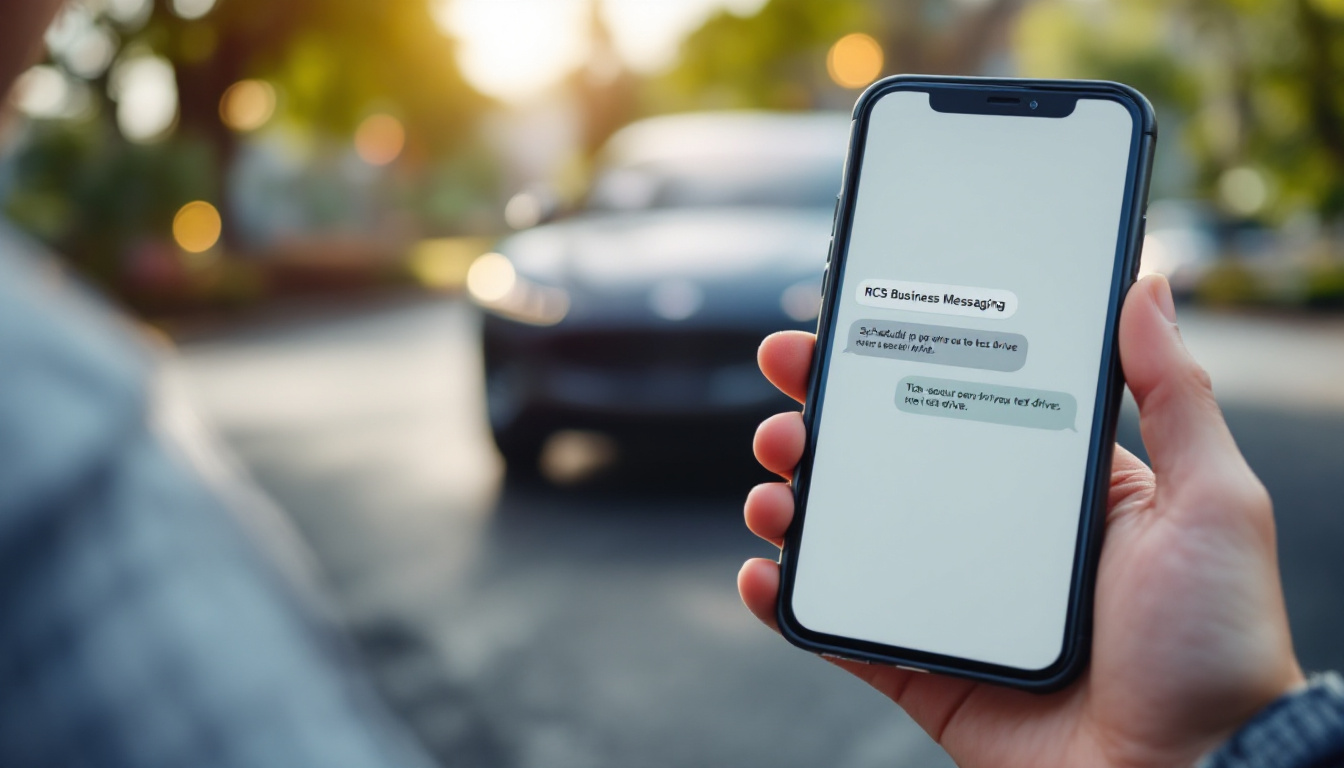As technology continues to evolve, the automotive industry is embracing new tools and techniques to enhance customer engagement and streamline operations. One such innovation is Rich Communication Services (RCS) business messaging, which presents a transformative opportunity for dealerships, particularly in the area of test drive scheduling. This article explores RCS business messaging, its impact on the automotive sector, and how it can revolutionize the test drive experience for both customers and dealerships.
Understanding RCS Business Messaging
RCS business messaging is a protocol that allows businesses to communicate with customers via enriched text messaging, offering more features than traditional SMS. This includes images, carousels, quick replies, and interactive elements which provide a richer experience, making it easier to convey information effectively.
Unlike standard text messages, RCS integrates seamlessly with branding elements, allowing businesses to maintain their identity while communicating with clients. This feature is particularly important for automotive dealerships aiming to create a consistent and professional image throughout their customer interaction journey. By incorporating logos, color schemes, and personalized greetings, dealerships can enhance brand recognition and foster a sense of trust with their customers.
The Basics of RCS Business Messaging
At its core, RCS business messaging facilitates communication that is not only informative but also engaging. It can incorporate multimedia, such as photos and videos of vehicles, ensuring that customers receive a visually appealing message. By including interactive buttons, dealerships can boost engagement, prompting users to take immediate action, such as scheduling a test drive. This interactivity not only streamlines the customer journey but also allows for a more personalized experience, catering to individual preferences and needs.
RCS is designed to work on a variety of devices and platforms, making it accessible to a broader audience. By leveraging RCS, dealerships can reach more potential customers through their preferred communication channel, whether that be on a smartphone or tablet. Furthermore, the analytics capabilities of RCS allow businesses to track engagement metrics, providing insights into customer behavior and preferences, which can be invaluable for tailoring future marketing efforts.
The Role of RCS in the Automotive Industry
In the context of the automotive industry, RCS messaging serves as a powerful tool to improve customer interaction and foster a seamless experience during the car buying process. The ability to provide timely updates and reminders enhances customer satisfaction and keeps potential buyers engaged. For instance, dealerships can send reminders for upcoming service appointments or notify customers about special financing options, ensuring that they feel valued and informed throughout their journey.
One of the key benefits of RCS in automotive sales is instant access to critical information. For example, dealerships can send out dynamic messages regarding new inventory, exclusive offers, and important announcements, thus maintaining customer interest and engagement throughout the buying journey. Additionally, the use of RCS can help in collecting customer feedback post-purchase, allowing dealerships to refine their services and address any concerns promptly. This two-way communication fosters a relationship built on transparency and responsiveness, which is essential in today’s competitive market.
The Impact of RCS on Test Drive Scheduling
Test drives are a crucial step in the car buying process. They provide potential buyers with the firsthand experience necessary to make informed decisions. RCS business messaging can simplify test drive scheduling, making it more convenient for customers and enhancing operational efficiency for dealerships.
With RCS, dealerships can send personalized messages to potential buyers, allowing them to select dates and times that suit their schedules. This reduces the back-and-forth that traditionally accompanies scheduling, making the process more efficient and user-friendly.
Streamlining the Scheduling Process
By implementing RCS for scheduling test drives, dealerships engage customers in a dynamic way. They can include interactive elements such as “book now” buttons that allow customers to view available slots. This immediacy encourages customers to book a test drive on the spot, increasing the likelihood of converting interest into action.
In addition, RCS allows for automated reminders and confirmations, which minimize missed appointments. By sending reminders a day before the scheduled test drive, dealerships can ensure that customers are prepared, making the experience smoother for everyone involved.
Moreover, the integration of RCS can facilitate real-time updates regarding any changes in scheduling or availability. For instance, if a particular model becomes unavailable or if there are delays, customers can be promptly informed through RCS messaging. This transparency not only keeps customers in the loop but also builds trust, as they feel prioritized and respected throughout their car-buying journey.
Enhancing Customer Experience with RCS
RCS not only streamlines processes but significantly enhances the overall customer experience. With interactive content, customers can view detailed information about vehicle options, explore features, and even receive curated content that speaks directly to their interests.
As customers interact with enriched messages, they can feel more connected to the brand. This personalized form of engagement leads to higher levels of satisfaction and fosters loyalty. When customers feel valued, they are more likely to return for future purchases or recommend the dealership to friends and family.
Additionally, RCS can facilitate customer feedback right after the test drive. Dealerships can send follow-up messages that invite customers to share their thoughts and experiences. This not only demonstrates that the dealership cares about customer opinions but also provides valuable insights that can be used to improve services. By actively seeking feedback, dealerships can adapt and refine their offerings, ensuring they meet the evolving needs of their clientele.
The Future of RCS in Automotive Industry
The integration of RCS business messaging in the automotive industry is still relatively new, but its potential is immense. As technology advances and consumer preferences shift, dealerships that adopt RCS messaging will stay ahead of the curve and cater to modern communication demands. This innovative messaging format not only enhances customer engagement but also streamlines communication processes, making it easier for dealerships to connect with their clientele effectively.
The future of RCS in automotive is tied to the ongoing digital transformation of the industry. As more customers become comfortable with technology, the necessity for a cohesive and engaging digital communication approach will be crucial. With the rise of connected vehicles and smart technologies, the automotive sector is poised for a revolution that will redefine how consumers interact with brands. RCS can play a pivotal role in this transformation, offering features like rich media, car maintenance reminders, and personalized offers that can significantly enhance the customer experience.
Predicted Trends for RCS in Automotive
Experts predict that the use of RCS in the automotive sector will continue to rise. As dealerships recognize the benefits of enhanced customer communication, more will incorporate RCS into their marketing and operational strategies. This shift is not just about adopting new technology; it’s about rethinking the entire customer journey and ensuring that every touchpoint is optimized for engagement and satisfaction.
- Increased Personalization: Data-driven insights will lead to more tailored messaging, allowing dealerships to cater to specific customer needs and preferences. This could include personalized service reminders based on vehicle usage patterns or targeted promotions for accessories that complement a customer’s vehicle.
- Integration with AI: AI solutions will enable dealerships to manage and optimize RCS interactions, providing instant responses to customer inquiries. Chatbots powered by AI can handle common questions, freeing up staff to focus on more complex customer needs and enhancing overall efficiency.
- Broader Adoption: As consumer understanding of RCS grows, more dealerships will invest in this technology, leading to standardization in customer communication. This widespread adoption will likely encourage manufacturers to develop vehicles that are more compatible with RCS features, further driving the technology’s relevance in the industry.
Potential Challenges and Solutions
While the benefits of RCS are clear, challenges do exist. One of the primary obstacles is ensuring that all customers can access RCS messages, as not all devices currently support the technology. This digital divide could potentially alienate certain customer segments, particularly those who are less tech-savvy or who prefer traditional communication methods.
To tackle this, dealerships can adopt a hybrid approach. By providing traditional SMS options alongside RCS, they can ensure that all customers receive essential communications, regardless of their device capabilities. Furthermore, leveraging customer data can aid in understanding which segments of the audience prefer which communication methods. In addition, dealerships can invest in educational campaigns to inform customers about the benefits of RCS, helping to bridge the gap and encourage wider adoption. As RCS continues to evolve, it will be essential for dealerships to remain adaptable, ensuring that they meet the diverse needs of their customer base while maximizing the advantages of this powerful messaging tool.
Implementing RCS Business Messaging in Your Dealership
For automotive dealerships looking to enhance their customer engagement strategies, implementing RCS business messaging is a significant step forward. With the right planning and execution, it can yield considerable benefits across various operational facets.
Considering the integration of RCS into existing systems is crucial to ensure a roadmap that aligns with dealership goals and capabilities. By engaging all stakeholders, from sales teams to customer service representatives, dealerships can facilitate a smooth transition. This collaborative approach not only helps in identifying potential challenges early on but also fosters a culture of innovation, where employees feel empowered to contribute ideas that can enhance customer interactions.
Steps to Integrate RCS Messaging
Integrating RCS messaging into dealership operations can be achieved through a few key steps:
- Choose an RCS Provider: Research and select a provider that aligns with your dealership’s needs.
- Train Staff: Provide comprehensive training for staff to ensure they are knowledgeable about RCS capabilities and benefits.
- Develop Content Strategies: Plan engaging content that resonates with target audiences and aligns with dealership goals.
- Monitor and Adapt: Continually analyze RCS performance and customer feedback to refine the messaging strategy.
Measuring the Success of RCS Implementation
Once RCS is implemented, measuring its success is essential to validate its effectiveness and drive further improvements. Key performance indicators (KPIs) such as open rates, engagement metrics, conversion rates, and customer feedback should be closely monitored.
By analyzing these metrics, dealerships can gauge the impact of RCS on test drive scheduling and overall customer interactions, facilitating informed decisions for ongoing optimization. Establishing a solid feedback loop with customers to further improve messaging strategies can also enhance the overall effectiveness of RCS business messaging. Additionally, leveraging customer segmentation data can help tailor messages even more precisely, ensuring that each communication feels personal and relevant to the recipient’s unique preferences and needs.
Moreover, integrating RCS with other digital marketing tools can amplify its effectiveness. For instance, combining RCS messaging with email campaigns or social media promotions can create a cohesive marketing strategy that reaches customers across multiple touchpoints. This multi-channel approach not only reinforces the dealership’s brand message but also increases the likelihood of engagement, as customers are more likely to respond when they encounter consistent messaging across different platforms. Embracing such synergies can significantly enhance the overall impact of RCS business messaging in the automotive sector.
Ready to Elevate Your Dealership’s Communication?
Embrace the future of automotive customer engagement with nativeMsg, The RCS Business Messaging Creator. Transform your test drive scheduling and customer interactions into interactive experiences that captivate and convert. With our easy-to-use drag-and-drop interface, analytics, and comprehensive management platform, you can boost engagement and streamline your operations effortlessly. Don’t miss out on the opportunity to revolutionize your business messaging and drive results. Get Started today and see the difference for yourself!
Free Trial
Get Started With RCS
Business Messaging!
Unlock the power of RCS and revolutionize your customer engagement.





